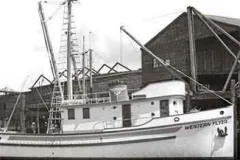Bringing the Western Flyer, and History, Back to Life

As a first year graduate student in marine biology, I shared a large office with other students. I normally did a good job of not disturbing them, but I totally failed in this while reading John Steinbeck’s The Log from the Sea of Cortez. I am sure my laughter was heard by everyone in the office, and by passers-by in the hall as well.
Why was I reading Steinbeck instead of a scientific paper? Steinbeck is, of course, best known as the author of Of Mice and Men, The Grapes of Wrath, and other literary masterpieces. But in 1940 he sailed to Mexico's Sea of Cortez on an extraordinary voyage of discovery aboard a chartered fishing vessel named Western Flyer. With his best friend, marine biologist Ed Ricketts, the author studied tidepools there and later they published Sea of Cortez: A Leisurely Journal of Travel and Research, a pioneering book about, among many things, the fledgling scientific disciplines of ecology and marine conservation.
The narrative portion of the book (The Log from the Sea of Cortez) is still in print, and indeed still a best seller. But what about the boat on which the adventure took place? It turns out it, too, is still around, but in need of some serious work. Soon, however, it may return to its former “glory” (even in its heyday it was no luxury yacht). For this we can thank the Western Flyer Foundation and its supporters, who are working to restore this historic vessel and give it the ability to return to the sea. The idea is to stir curiosity by providing rich and remarkable education, research and creative opportunities to students, professional and citizen scientists, writers and artists, who will explore connections between people and nature and scrutinize how humanity depends upon and impacts natural systems.
I still remember the descriptions of the finicky outboard motor that (in theory) powered the small skiff and caused me to laugh so hard. A seven-point personality assessment of the motor (jokingly renamed a Hansen Sea-Cow) begins with “Incredibly lazy, the Sea-Cow loved to ride on the back of a boat, trailing its propeller daintily in the water while we rowed” and ends with “It loved no one, trusted no one. It had no friends.” Many people have had similar relationships with cranky equipment – I certainly did doing field work on the coral reefs of Jamaica.
If you are marine biologist, want to be, or just love the ocean and have not read this book, do it—you are in for a treat. But it will be even more of a treat when one day we can all visit the boat that made the book possible.

